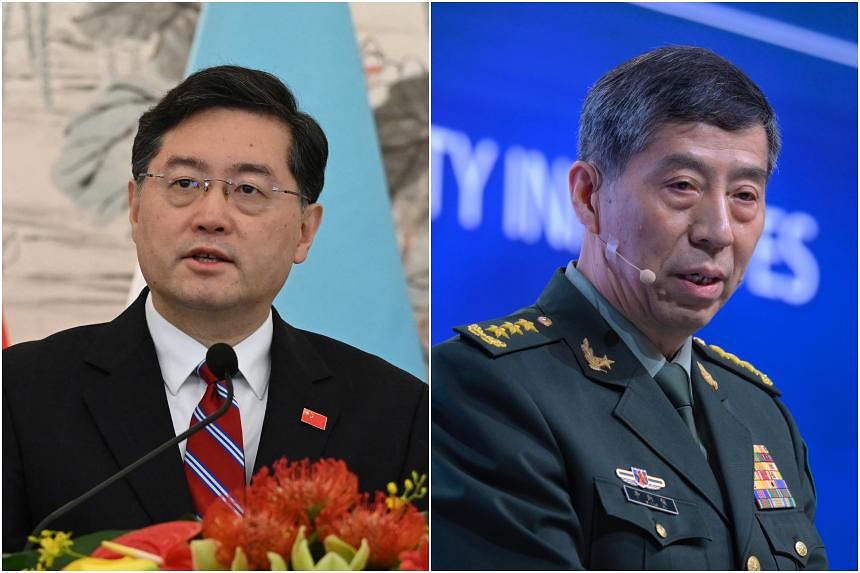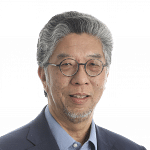BEIJING - The Communist Party of China (CPC) is tipped to sack at least three disgraced members of its Central Committee during a conclave that could be held in February.
The third plenum of the CPC’s elite committee will likely strip People’s Liberation Army (PLA) general and former defence minister Li Shangfu, former foreign minister Qin Gang and former Rocket Force commander Li Yuchao of their full memberships in the committee. The two Lis are not related.
This move will draw a line under the cases of these leaders who had been removed from their government positions in 2023, by relieving them of their party positions as well.
The read-out of a Politburo meeting held on Jan 31 did not name a date for the third plenum.
It is understood that members of the Central Committee can be removed only during a plenum.
In 2008, former vice-minister of culture Yu Youjun was removed as a Central Committee member in the third plenum of the 17th Central Committee for unspecified disciplinary offences.
The Central Committee, which directs all party work, currently has 205 full members and 171 second-tier alternate members who have no voting rights.
Central Committee members are elected every five years during a national party congress. In turn, they vote for the Politburo, the Standing Committee of the Politburo and the party’s general secretary.
The trio will be succeeded by alternate members who were the top three vote-getters at the 20th party congress in 2022.
Alternate members are up-and-coming party, government and military officials.
It is the norm for an alternate member to step up if and when a full member is ousted or dies in office.
The Central Committee meets at least once a year at a plenary session, and there are seven such meetings in a committee’s five-year term.
Apart from the second plenum that usually takes place in February or March, plenums are usually held in the autumn from September to November. No reason has been given for the delay this time for the third meeting of the current committee.
It is unclear if the date of future plenums will be standardised and held in February ahead of the annual full session of Parliament and its advisory body in March.
General Li Shangfu, who turns 66 in February, has disappeared from public view since August 2023. He stepped down as defence minister and state councillor in October and is reportedly under investigation for corruption, but there has been no official word on his fate.
Mr Qin, who turns 58 in March, was removed as foreign minister last July after a month-long disappearance. He was stripped of his state councillor title – a Cabinet position that ranks below vice-premiers and above ministers – last October.
Foreign media reports said Mr Qin was ousted after an alleged affair with a Chinese reporter while serving as China’s ambassador to the United States from 2021 to 2022.
General Li Yuchao, 61, and several of his immediate subordinates are under investigation for corruption. He was commander of the Rocket Force, which controls the country’s nuclear and conventional missiles, from January 2022 to July 2023.
The top brass of the Rocket Force was purged after unspecified “shortcomings” were uncovered during a field assessment of an exercise, according to the PLA Daily.
During the plenum, Admiral Dong Jun, 62, who succeeded Gen Li as defence minister, is likely to replace his predecessor as one of four members of the top decision-making Central Military Commission (CMC).
If confirmed, the navy will have two seats on the CMC – a sign that President Xi Jinping is serious about his 2017 pledge to turn the world’s largest armed forces from a traditional land power into a maritime one.
The other navy person on the CMC is Admiral Miao Hua, who is concurrently director of the military’s Political Work Department, which is the CMC’s chief political organ and leads all political and cultural activities in the PLA.
Adm Dong is likely to become one of the Cabinet’s five state councillors – as is the norm for defence ministers – during the annual full session of Parliament.
Another likely development at the third plenum, speculated by some political pundits, is that Minister of Public Security Wang Xiaohong, 66, could be named director of the Central Committee’s General Office, a position currently held by Mr Cai Qi, 68.
If that happens, he would simultaneously be promoted to the CPC’s Politburo, which currently has 24 members and is ranked one notch below the all-powerful Standing Committee, as heads of the General Office are also usually members of the Politburo.
Currently, the director of the General Office also serves as the chief of staff for the party’s general secretary.
The General Office is responsible for drafting and circulating party directives and internal memos as well as arranging logistics for major meetings of the Central Committee and its Politburo. It is also in charge of preparing meeting agendas, recording and filing meeting minutes, as well as distributing communications to meeting participants and stakeholders.
But it is unclear whether Mr Wang, if he becomes head of the General Office, would also gain a position on the all-powerful Standing Committee as Mr Cai unusually did at the 2022 party congress.
Mr Cai raised eyebrows at the congress when it was announced that he would join the Standing Committee and concurrently serve as director of the General Office. It remains unclear why he was promoted to the Standing Committee.
Apart from personnel changes, the third plenum will likely be focusing on the economy as it usually does. It is expected to look at buoying the slowing economy, curbing unemployment and boosting domestic and foreign investors’ confidence.
China’s economy grew 5.2 per cent in 2023, slightly higher than the official target of around 5 per cent, but is plagued by a deepening property crisis, deflationary risks and lukewarm demand.
- Additional reporting by Lim Min Zhang


